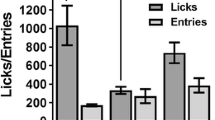Abstract
The present study investigated in rats whether variables which may affect the animals' tolerance for delay of reward could be critical for the benzodiazepine-induced release of punished behavior. Rats were subjected to conflict situations during which signalled FR4 non-punished periods (lights-off) alternated with punished periods of different durations signalled by lights-on stimuli. Lever presses during punished periods resulted in the delivery of both one food-pellet and one electric foot-shock (0.45 mA). The antipunishment effect of diazepam (2 mg/kg IP) clearly depended on the duration of the punished periods, release of punished behavior being observed only when punished periods exceeded 1 min. The duration of punished periods required for diazepam-induced release of responding was affected by factors which modified the contrast between rewards received in punished and non-punished periods. One of these factors was the FR schedule imposed during non-punished periods, since the anti-punishment effect of diazepam was observed during short-lasting (30-s and 1-min) punished periods separated by FR24 non-punished periods. A second factor was the ratio of the durations of punished and non-punished periods: diazepam released behavior during 2-min punisheds when the duration of the intercurrent non-punished periods was 1 min, but not when it was 4 min. The predictability of the duration of the punished periods also modulated the effect of diazepam since: with 1 min punished periods, diazepam released punished responding during the first exposures of the rats to the experimental session, but lost part or all its efficacy in animals extensively trained to the procedure.
It is tentatively proposed that not only punishment, but also delay of reward induced by passive avoidance of the punished response, are affected by benzodiazepines.
Similar content being viewed by others
References
Birk J, Noble RG (1981) Naloxone antagonism of diazepam-induced feeding in the Syrian hamster. Life Sci 29:1125–1131
Canon JG, Lippa AS (1977) Use of DRL in differentiating anxiolytic and neuroleptic properties of CNS drugs. Pharmacol Biochem Behav 6:591–594
Cook L, Davidson AB (1973) Effects of behaviorally active drugs in a conflict-punishment procedure in rats. In: Garattini S, Mussini E, Randall LO (eds) The benzodiazepines. Raven press, New York, pp 327–345
Cooper SJ (1980) Benzodiazepines as appetite enhancing compounds. Appetite 1:7–19
Dantzer R (1977) Behavioral effects of benzodiazepines: a review. Biobehav Rev 1:71–86
Dantzer R (1978) Dissociation between suppressive and facilitating effects of aversive stimuli on behavior by benzodiazepines. A review and reinterpretation. Prog Neuro-Psychopharmacol 2:33–40
Geller I, Kulak JT, Seifter J (1962) The effects of chlordiazepoxide and chlorpromazine on a punishment discrimination. Psychopharmacologia 3:374–385
Gray JA (1982) Précis of the neuropsychology of anxiety: an enquiry into the functions in the septo-hippocampal system. Behav Brain Sci 5:469–534
Hodges HM, Green S (1984) Evidence for the involvement of brain GABA and serotonin systems in the anticonflict effects of chlordiazepoxide in rats. Behav Neural Biol 40:127–154
Iwasaki T, Ezawa K, Iwahara S (1976) Differential effects of chlordiazepoxide on simultaneous and successive brightness discrimination learning in rats. Psychopharmacology 48:75–78
Kilts CD, Commissaris RL, Rech RH (1981) Comparison of anticonflict drug effects in three experimental animal models of anxiety. Psychopharmacology 74:290–296
Miczek KA (1973) Effects of scopolamine, amphetamine and chlordiazepoxide on punishment. Psychopharmacologia 28:373–389
Prado de Carvalho L, Grecksch G, Chapouthier G, Rosier J (1983) Anxiogenic and non-anxiogenic benzodiazepine antagonists. Nature 301:64–66
Sanger DJ, Blackman DE (1975) The effects of tranquilizing drugs on timing behaviour in rats. Psychopharmacologia 44:153–156
Sanger DJ, Blackman DE (1976) Rate-dependent effects of drugs: a review of the literature. Pharmacol Biochem Behav 4:73–83
Schwartz D (1963) Méthodes statistiques à l'usage des médecins et des biologistes Flamarion, Paris, pp 239–241
Sepinwall J, Cook L (1980) Mechanism of action of the benzodiazepines: behavioral aspect. Fed Proc 39:3024–3031
Thiébot MH, Soubrié P, Hamon M, Simon P (1984) Evidence against the involvement of serotonergic neurons in the antipunishment activity of diazepam in the rat. Psychopharmacology 82:355–359
Thiébot MH, Le Bihan C, Soubrié P, Simon P (1985) Benzodiazepines reduce the tolerance to reward delay in rats. Psychopharmacology 86:147–152
Tye NC, Everitt BJ, Iversen SD (1977) 5-Hydroxytryptamine and punishment. Nature 268:741–743
Vogel JR, Beer B, Clody DE (1971) A simple and reliable conflict procedure for testing anti-anxiety agents. Psychopharmacologia 21:1–7
Author information
Authors and Affiliations
Rights and permissions
About this article
Cite this article
Thiébot, MH., Soubrié, P. & Simon, P. Is delay of reward mediated by shock-avoidance behavior a critical targer for anti-punishment effects of diazepam in rats?. Psychopharmacology 87, 473–479 (1985). https://doi.org/10.1007/BF00432516
Received:
Accepted:
Issue Date:
DOI: https://doi.org/10.1007/BF00432516




